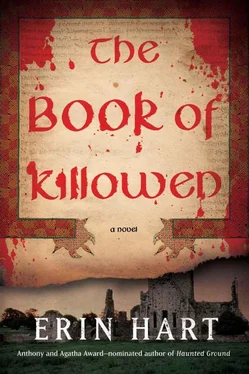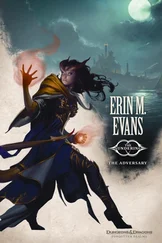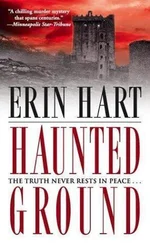She pushed the laptop away from her, and as she did so, her elbow brushed against a tweed throw that someone had left tossed casually over the arm of the sofa. She looked down to see the corner of a Moleskine notebook peeping out from under the dark woolen fringe. Her curiosity aroused, Nora opened the cover to discover whose book this might be. It was a journal. The writing was small, compact, and in a female hand, it seemed—and in Spanish, which perhaps answered her question. Was this the sad story that Eliana had been reading on the evening they arrived? Nora tried to recall whether the book she’d seen in the girl’s room had a yellow cover like this. She scanned a few phrases at the top of the page: … y la forma en que me mira… A veces parece que diga el nombre de mi madre, pero quizás es sólo por accidente. Something about an accident? She could read the letters, but the words themselves formed a cipher, a code she could not crack.
She heard someone coming. She quickly closed the cover and slipped the journal back into its cushioned crevice.
It was Claire Finnerty.
“Wonderful news, that they found Deirdre and the baby,” Nora said.
“Yes, a great relief. We’re all very glad to know they’re safe.”
“And Anca as well,” Nora said.
Claire threw her a suspicious look. “Yes.”
“I don’t blame you for trying to keep her name out of the investigation, telling us that she’d left. Shawn gave us the whole story this afternoon.”
Claire Finnerty swung around to face Nora full on. “Did she, now?”
“We found Anca’s cigarettes during the search. Shawn had to tell us. She said you were trying to protect the girl. I think that’s commendable.”
Claire offered no response.
“It’s hard to know what to do, sometimes, to protect people.” Nora knew she was in danger of overstepping, but she couldn’t seem to stop herself. “Maybe last night wasn’t the first time you’d seen Deirdre’s father treat her that way. But I know what it’s like, not having any legal standing to intervene—”
“Please stop, just stop talking!” Claire Finnerty was grasping the edge of the sink. Her voice sounded strangled. After a long moment, she turned and fled the kitchen, leaving the water running over some salad greens.
Nora turned off the tap. She shouldn’t have pushed Claire so hard just to satisfy her own curiosity. And yet, recalling the shock and anger in the faces around the dinner table, she was sure that her memory wasn’t mistaken. It had been Claire Finnerty insisting that they find a way to get Deirdre Claffey away from her father. Someone had found a way, but perhaps it wasn’t what Claire had in mind.
Joseph and Eliana came ambling up to the kitchen through the courtyard garden. Both of them had witnessed the scene at dinner last night, but as far as Nora knew, they were still ignorant of Vincent Claffey’s death. Better if they were spared the details. The way Cormac’s father had clung to Eliana’s hand after Claffey’s outburst last night—you could read it as a protective gesture. Was that what was going on later on as well, when the girl was in his room? He didn’t want me to leave , she’d said. Was he afraid Vincent Claffey would come back to Killowen? Cormac had the same protective streak as his father, which could be maddening at times, but it was also oddly reassuring. And Cormac probably had no idea where he’d picked up that character trait.
“Time to wash up for supper,” Eliana was saying to Joseph, letting go of his arm. “Would you like to rest a minute here before we go upstairs?”
Nora saw Eliana check under the throw on the sofa and slip the yellow notebook out between the cushions and into her bag.
“I’ll take him to get washed up, Eliana, if you’d like a break before supper,” Nora said. She motioned Eliana a short distance away so that Joseph might not overhear their conversation.
“Did you have a good day?” Nora asked.
Eliana glanced at her briefly. “Yes, everything is fine today. We were studying these cards—what do you call them?”
“Flash cards.”
“Yes, the flash cards. He likes the pictures, but he gets eh… nervous?” She tried to find the proper way to express it.
“Flustered? Or perhaps you mean frustrated?”
“Yes, that’s it— frustrated . I try to tell him he will learn the words again. That it will take patience.”
“That’s true,” Nora said. She glanced over at Joseph, who seemed to be nodding off in his corner of the sofa. “I wanted to ask if there’s anything more that Cormac and I could be doing to help you.”
Eliana’s eyes flicked away nervously. “I hope I am doing the right things…”
“You’re doing great work, Eliana. He seems to enjoy the time spent with you.” Nora reached up to give the girl’s shoulder a squeeze. “I want to make sure you know that we’re here, both Cormac and myself, if you have questions about anything, or just want to talk.” Eliana nodded without looking up. “Now, a little time off.”
“I don’t need it.”
“I insist,” Nora said. “I can stay with Joseph, and you can do whatever you’d like to do.”
Eliana looked doubtful. “You’re certain?”
“Yes, go and enjoy yourself.”
Eliana rose slowly from her chair and headed for the stairs, not visibly cheered by the prospect of time to herself. This reluctance to leave Joseph was becoming a pattern. A worrisome pattern, if she were honest.
Nora turned back to find that Joseph had cracked one eye open. He’d been watching them the whole time, the sly old devil. “Narb a fisking torrit,” he said, drawing his hand over his face. “Her fox, it’s a looken peas. Peas.” He shook his head and with one hand seemed to bat the words away, a gesture that said he knew what was happening and was buggered if he could do anything about it. Here he was, back at the peas again. That was the way this thing seemed to work; he’d make steady forward progress and then would come a sort of verbal hiccup, and he’d drop back to where he’d been a week ago. Back with the vegetables.
“I think Eliana’s all right,” Nora said. “Probably just a bit homesick.”
He looked puzzled.
“Missing her family, you know.”
He looked at her with such a fixed stare that she wondered if he understood.
“Neary, shows a brick.” He put his palms together, then opened them like a book. Like an endless game of charades, Nora thought, and he can’t even tell us when we’ve guessed right. “A brick,” he said, and made the book gesture again.
“A book?” She exaggerated the O shape of her lips, trying to show him. “What is it about a book?”
“Hermakes a voil.” Here he scooped one hand, as if to say, Come here , and she moved closer. “No! A voil in it, a spog, a spogget.” Beads of sweat were beginning to form on his forehead, as if the effort of making oneself understood was hard physical work. She searched his face for hints, clues to the meanings he was going for, to no avail. He definitely had something to tell her, perhaps something important. That was the trouble—no way to know.
“Bollocks,” he muttered.
“Now that I understand,” Nora said. “And you’ll forgive me if I concur.”
Cormac looked up from his work in the cutaway. He was digging directly below the spot where they’d found the satchel, hoping there might be a few more clues buried in the peat. Killowen Man’s brooch was still unaccounted for, not to mention the contents of his satchel. The likeliest scenario was that both the books and the brooch were stolen by the assassins who had stuck their blades into Killowen Man’s belly.
Читать дальше












